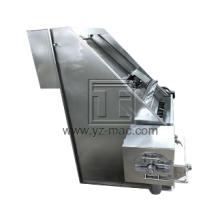Horizontal fertilizer fermentation tank
A horizontal fertilizer fermentation tank is a type of equipment used for the aerobic fermentation of organic materials to produce high-quality fertilizer. The tank is typically a large, cylindrical vessel with a horizontal orientation, which allows for efficient mixing and aeration of the organic materials.
The organic materials are loaded into the fermentation tank and mixed with a starter culture or inoculant, which contains beneficial microorganisms that promote the breakdown of the organic matter. The tank is then sealed to prevent the escape of odors and to maintain optimal temperature and moisture levels for the microbial activity.
During the fermentation process, the organic materials are regularly mixed and aerated using agitators or mechanical paddles, which help to distribute the microorganisms and oxygen throughout the material. This promotes the rapid decomposition of the organic matter and the production of humus-rich fertilizer.
Horizontal fertilizer fermentation tanks are commonly used for processing a wide range of organic materials, including animal manure, crop residues, food waste, and green waste. They can be operated using a variety of power sources, such as electricity or diesel fuel, and can be customized to meet the specific needs of different applications.
Overall, horizontal fertilizer fermentation tanks are an effective and efficient way to convert organic materials into high-quality fertilizer. They can help to reduce waste and improve soil health, making them an important tool for sustainable agriculture and waste management.






